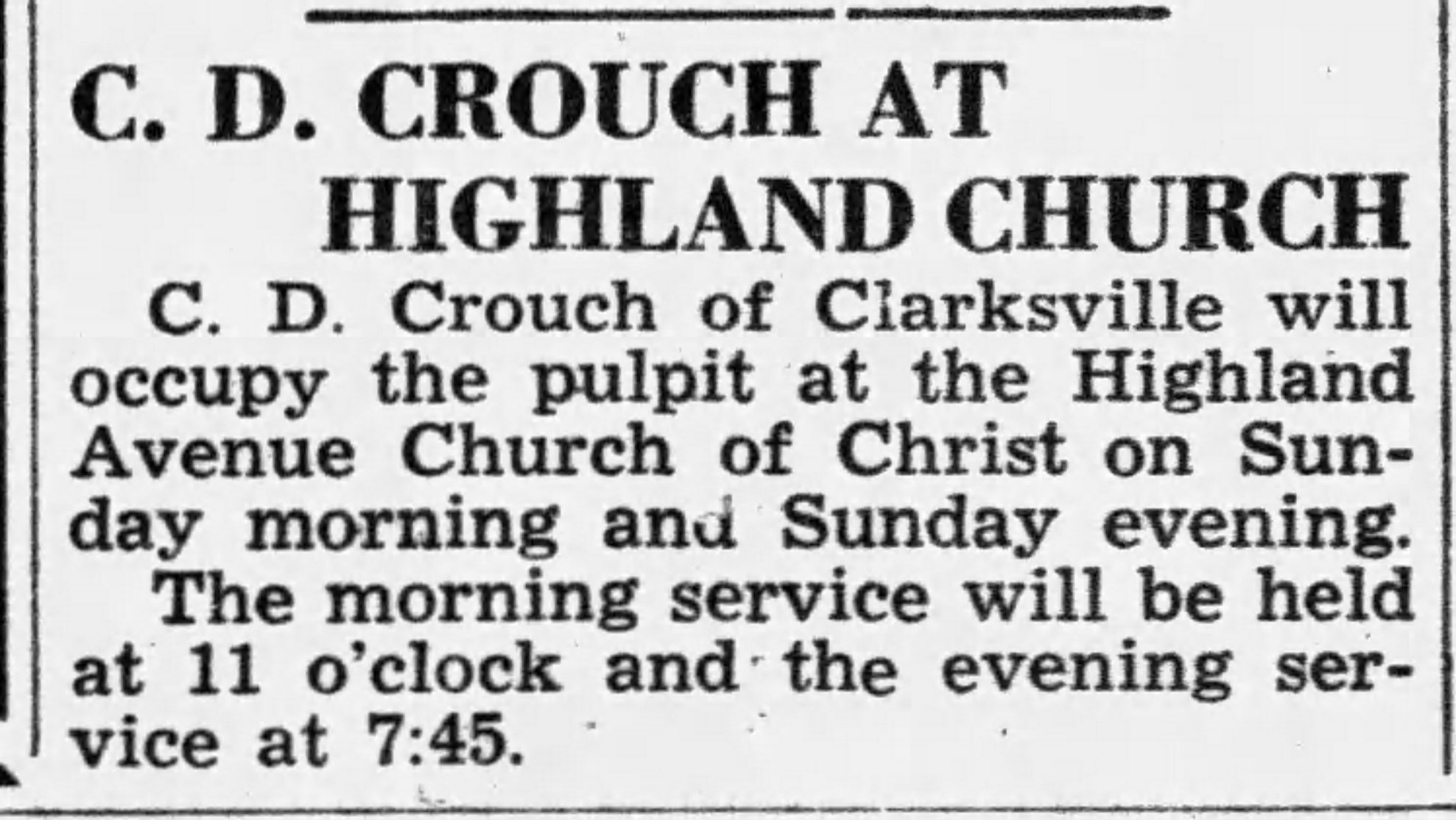Charles David Ewing Crouch
1884-1964

![]()
The Life of C. D. Crouch
Charlie David Ewing Crouch was born in Henry County, Tennessee, on March 6, 1884. He was the second of five children born to Franklin Jackson Crouch (1841-1932) and Sarah F. Crouch (1849-1922).
As a boy, the family attended the congregation then known as Sulphur Well Academy Church of Christ, located in the northeast corner of Henry County, Tennessee, near Kentucky Lake. This is where Charlie grew up and where he was baptized into Christ by the hands of W. T. Boaz in 1904. No matter where life took him, this church, this area, was home.
Charlie determined relatively young that he wanted to preach the gospel of Christ. Beginning his preaching career at Smyrna, near DeQueen, Arkansas, in 1906, he was 22 years of age. Soon, the need to advance in education led him to Bowling Green, Kentucky, in 1907. Attending Potter Bible College allowed him to sit at the feet of great educators like James A. Harding and T. Q. Martin. Another stop on the road to a well-rounded education was at Henderson, Tennessee, where he attended National Teachers Normal And Business College, a school operated by A. G. Freed and N. B. Hardeman. While in school, he continued to preach where he could and held meetings through the summers.
Upon his departure from Henderson, he made for Marvell, Arkansas, in the spring of 1910. At that time, it was uncommon for a preacher to just work with one church, and such was the case with Charlie Crouch. Preachers were in need, and Charlie spread himself out as thinly as possible to cover as much area as he could.
When the opportunity arose, he was quite willing to enter the debate arena. One of his early debates was with Elder A. J. Sloan of the Missionary Baptist church. In July 1910, their discussion was conducted at Williams Crossroad church of Christ, about four miles from Lafayette, Tennessee. The topic discussed was the design of Baptism. Over the years, he and Sloan crossed paths upon the polemic platform several times.
Charlie Crouch was an evangelist and always desired to go where the gospel needed preaching. In January 1912, he moved to Witchita Falls, Texas, to work with the church on Bluff Street. Again, though stationing himself with this congregation, he attempted to preach for others he could get to in a four-week circuit.
Reports to the brotherhood papers of a preacher's evangelistic activities were very common in that day. Several reported the whereabouts and activities, the meetings and their results, of C. D. Crouch. He wrote mainly to the Gospel Advocate and Firm Foundation. But, he occasionally wrote to The Gospel Guardian in Texas and James A. Allen's paper in Nashville, The Apostolic Times.
About sixty miles east of Wichita Falls is the little town of Saint Jo, in Montague County, Texas. While on a preaching visit to that town, he was introduced to Miss Mary Lou McDowell. Their relationship quickly developed. A preacher needs a good wife, and "Mamie," as she was lovingly called, fit the bill completely. The two were wed on January 3, 1913, in the home of her parents. Another preacher in the area, and good friend, T. B. Thompson, performed the ceremony. A report was sent to the Gospel Advocate. Their published response was, "The Gospel Advocate extends heartiest congratulations!" (GA, 01.16.1913.p60) The two were blessed with three sons, Jackson Daniel (1914-1935), William Brodie (1917-2008), and Charles Edward (1920-2012). Brodie and Charles E. both followed in their dad's footsteps as preachers of the gospel.
After they were married, the Crouch family moved to Belton, near Killeen, Texas, where Charlie began preaching for the brethren in that town. However, they were not there long before moving back up north to Bowie, Texas where he continued to evangelize. Bowie wasn't far from St. Jo, and it seemed wise to be a little closer to Mamie's family since, on January 30, 1914, she gave birth to her first child, Jackson Daniel.
They lived in Bowie for a couple of years. All the time, he preached where he had the opportunity. In early 1916 the Crouch family left Bowie and settled in the East Texas town of Rock Springs, not far from Marshall. Again, he was involved in evangelistic work regularly. After two years in that part of the state, they went back to St. Jo and lived with family for a while. It was the spring of 1918. Again, he was engaged in evangelistic work throughout the region. In May, he reported to the Advocate that his son had been stricken with Typhoid, and that he had come down with it as well, resulting in having to pull back on his evangelistic activities. (GA,05.23.1918,p.493). By August, meeting efforts were back in full swing.
In November, the family moved to the Texas panhandle to work primarily with the church at Wellington. At the end of December, Charlie reported having to take a job with the Wellington Hardware Company to support his family. He stated that he had never been supported by the church in his work, but demands upon the family meant secular work was essential. (GA,12.25.1918,p.1305)
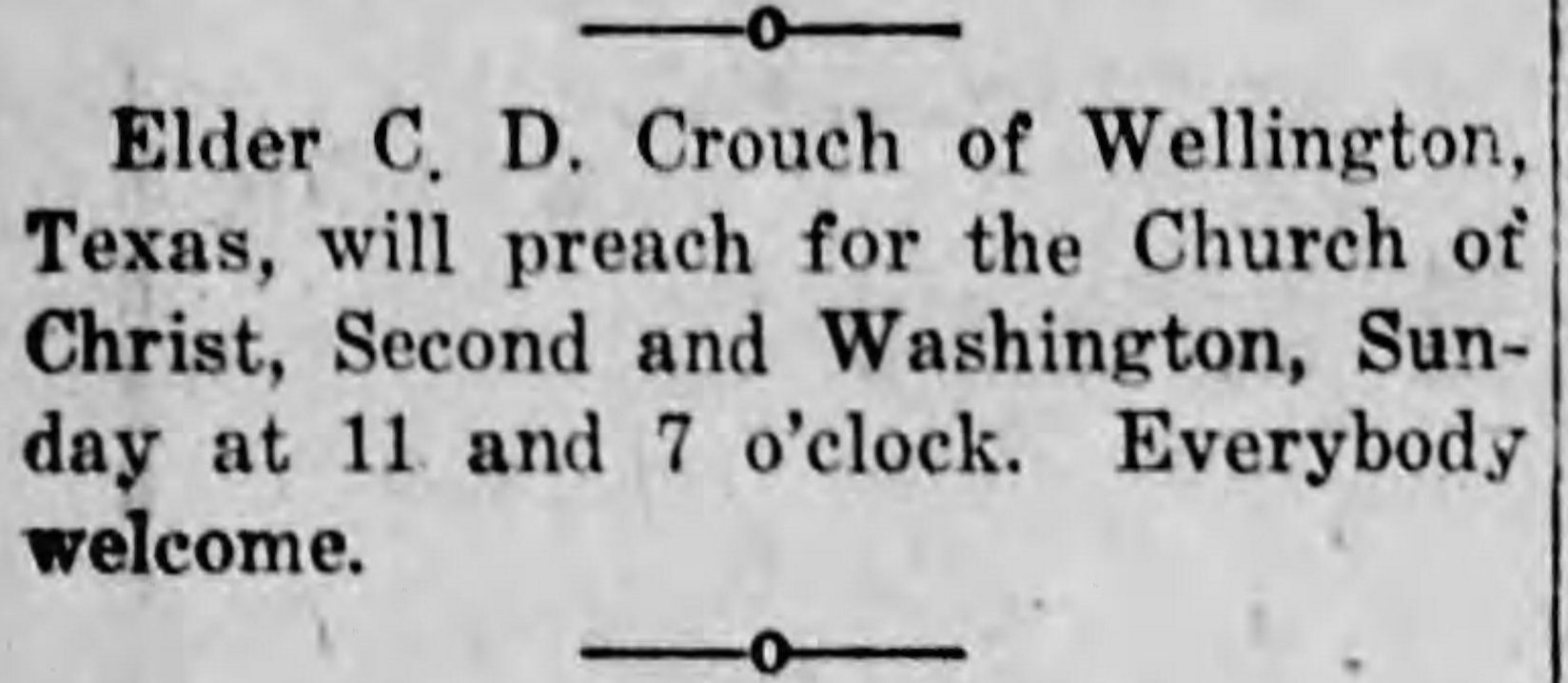
The Hobart Daily Republican, Hobart, Oklahoma
Friday, February 13, 1920, page 4
After about three years, the family departed for south Texas to Port Arthur, where he devoted the entire year of 1921 to evangelizing the area.
The Tennessean, Nashville, Tennessee
Monday, May 15, 1922, page 2
In the spring of 1922, news of his mother's declining health led Charlie to think he needed to try and get closer to home. They had a little farm a few miles out of Portland, Tennessee in the community of Fountain Head. Only a few miles from there was the work in Ashland City, a little west of Nashville. They needed a preacher, so the family moved there in May. The following November, he announced his intentions of debating a Baptist preacher in town by the name of E. H. Greenwall. The debate was to be devoted to the subject of Baptism. Reports of plans for the discussion appeared on the pages of the Gospel Advocate. Good attendance prevailed throughout the debate. Afterward, F. B. Srygley, who had attended, reported brother Crouch's success in the November 16 and 30th editions of the Advocate, on pages 1083 and 1134.
Sadly, what was feared concerning his mother became a reality. In the January 24, 1923 edition of GA were the following words, "The Gospel Advocate extends tender Christian sympathy to C. D. Crouch, of Ashland City, Tenn., in the death of his mother." (GA, 01.24.1923,p.4) Soon, the family moved to Fountain Head so Charlie could help his dad on the farm and preach for any churches that might need him in the vicinity. In the spring, he attended the second great meeting held in the Ryman Auditorium with his old teacher, N. B. Hardeman. The year before was the first effort, and he was away in Texas, so he did not intend to miss the opportunity. Thousands poured into the Ryman day and night for the meeting. Every day Hardeman's sermons appeared in their entirety in the Nashville Banner and The Tennessean. On the last night of the meeting, it was later reported that brother C. D. Crouch led the closing prayer. Throughout the summer, Charlie preached for the Clearview church of Christ near Portland.
Brother Crouch announced to the brotherhood in the pages of the Advocate in January 1925 of his need to go out on the land to make a living as a dirt farmer. He said he intended to preach when possible but that he had to earn a living to feed his family. The paper's editor followed by chastizing the brethren for not doing a better job supporting the preaching brethren, that they ought to be giving at least ten percent of their income to the Lord, and that it was a shame good men like brother Crouch had to leave the ministry to feed his family. (GA, 01.15.1925,p.57) He began preaching at Corinth, near his home one Sunday each month and was available to preach for others. In 1926 he began going down once a month to preach in Nashville for the Joe Johnston Avenue church of Christ.
In July 1927, brother Crouch met A. J. Sloan once again in a debate on baptism and the possibility of apostasy, in Sulphuria, Tennessee, about ten miles north of Gallatin. He had met him in a similar discussion seventeen years previous. In December, he had another debate with C. B. Massey in Corinth, about six miles east of Portland, again on the subject of Baptism. Then, in June of 1928, he conducted a debate with W. J. Watson, a Missionary Baptist, at White House, Tennessee. It was a six-night discussion on four propositions. A report on the debate appeared in the Advocate, July 28, 1928, page 720 under the pen of J. M. Dennis, who served as his moderator in the discussion. In November 1928, he had another debate with A. J. Sloan, who had moderated for W. J. Watson earlier in the year. The encounter was held at Rock Bridge in Sumner County and was a four-night discussion.
On November 14, 1935, the family suffered deep sorrow at the unforeseen passing of Charlie and Mamie's son J. D. He had suffered an attack of appendicitis. After having his appendix removed at a Nashville Hospital, his body failed, and he passed away. J. D. was just twenty-one years of age. Such hope, such potential was lost with his passing. The funeral was conducted in the Portland church house, and burial followed there in the Maple Hill Cemetery just across the street.
Reports of work failed to appear in the Advocate over the next years or so. It is uncertain why. Perhaps the circumstances led to staying closer to home. The next report of his work was in July of 1937, where it was revealed that Charlie was in Toronto, Canada. His intentions were to be there for three months but allowed for the possibility of being there indefinitely. While there, he encountered a fair bit of resistance to what he referred to as the "full gospel." His good friend W. L. Totty had reported earlier that brother Crouch was fighting against the teaching of premillennialism that had gone on there. By the end year, he returned to his Tennessee home and continued preaching and farming.
In April 1938, the family moved to Clarksville, Tennessee, to preach.
The Jackson Sun, Jackson, Tennessee
Friday, September 8, 1939, page 3
Then, in September 1940, brother Crouch announced that he had moved to Christopher, Illinois, to work among the churches in that region. He also explained that he intended to speak on the radio in Herrin, Illinois, over the next six months. On January 6, 1941, he sent in a report from Christopher explaining his regular weekend activities as follows, "I preached at Antioch on Saturday night, taught a Bible class there yesterday morning, and then preached at the morning worship. I drove to Herrin and preached over the radio in the afternoon, then went back to Antioch, where I preached at seven o'clock last evening. I teach a Bible lesson at Crawford Church on Wednesday night, one here on Thursday night, and one at Antioch on Friday night." (GA, 01.16.1941,p.69)
In May 1942, Charlie and his family engaged in a mission effort in the northwest corner of Louisiana in Springhill. There was no church there, and so he worked to establish a congregation. He was not kept back from focusing on the work as the churches in Tennessee supported the family. Initially, they met in a community hall. Within a few weeks, there were twelve to fifteen in regular attendance. He wrote an article that appeared in the May 28 edition of the Gospel Advocate, entitled "Concerning Names." In it, he wrote on the concern of denominationalizing the title "Church of Christ," describing that the more proper rendering would be "church of Christ," with the lower case "C" in church. This was a very practical concern as he was on the Christian battlefield, where he was forced to deal with every little detail of establishing a bona fide New Testament church. In his mind, it had to be exactly as the Scripture prescribed. By May of 1943, the Springhill work had its own building bringing continued growth. After three years in Springhill and establishing a good work there, Charlie accepted the small work at Morristown, Tennessee, early in 1945. He was supported by the church at Hillsboro in Nashville in this effort.
Morristown Gazette and Mail, Morristown, Tennessee
Thursday, February 1, 1945, page 3
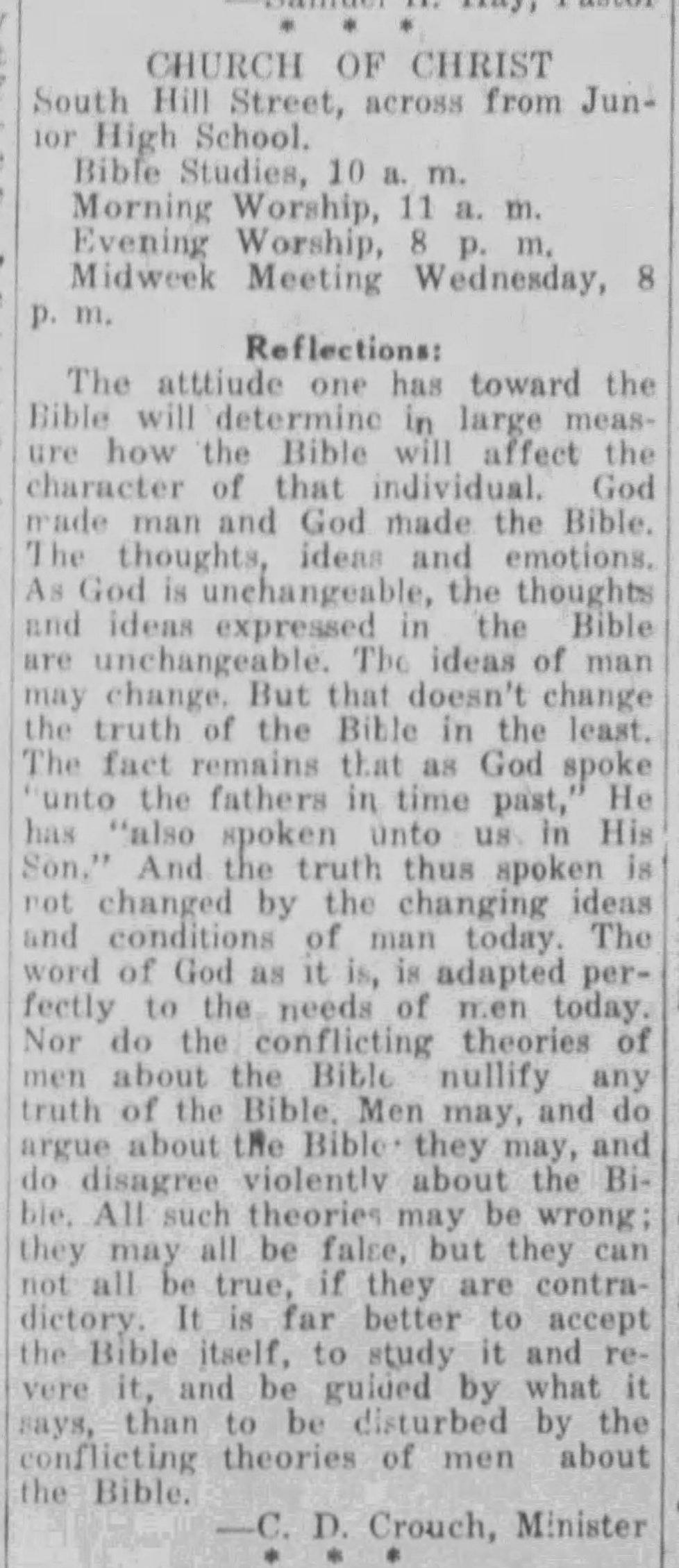
Morristown Gazette and Mail,Morristown, Tennessee
Friday, August 13, 1948, page 8
He was there for three years when he moved to Manila, Arkansas, to begin working among the brethren in that region. It was in October 1948. He was in Manila for about two years when he moved to Truman, Arkansas, to work with the church there. At the end of August 1952, he reported in the Advocate of his determination to leave Truman for the work in Dyess, Arkansas. He stayed there a couple of years. In January 1954, he went to Phoenix, Arizona, for a gospel meeting. While there, the brethren asked him to move there to assist in the work at Westside church of Christ. So, again the family moved, and he was there a couple of years. Another move followed in 1956 to Baxterville, Mississippi, to work with the church there. All along he continued sending reports of the successes of his work, the gospel meetings he preaching as well as the responses he saw.
Brother Crouch was a most capable and sound writer. He wrote articles for the Gospel Advocate; the Apostolic Times; Way of Salvation, a paper edited by Pervie Nichols and others.
C. D. and Mamie Couch were workers for Christ at a challenging but glorious time in the history of churches of Christ. He saw many changes and fought many battles for the Lord. During the last eight years of his life, they lived back at Fountain Head, Tennessee. He filled in for preachers when called upon and conducted plenty of funerals. Brodie and Charles E. were grown with families of their own, and out preaching the gospel in different places around the nation. All in all, they had children and grandchildren and an admiring brotherhood who loved and appreciated their life's labors.
It was in the latter part of 1964 that Charles E. announced to the brotherhood through the Gospel Advocate, "My father, C. D. Crouch, died in Camden on July 16. Illness had forced his retirement from a fifty-seven year ministry, eleven months before his passing." (GA,10.15.1964,p.668).
Within only about thirteen months, his Mamie followed him in death. They both are buried in the Maple Hill Cemetery across from Portland church of Christ in Portland, Tennessee.
-Scott Harp, 02.09.2021
Sources: Preachers of Today, Vol. 1, Scores of reports to the Gospel Advocate, Firm Foundation, The Gospel Guardian, The Apostolic Times, etc.
![]()
Reminiscing, No. 1
by C. D. Crouch
For full fifty-two years now, I have preached the gospel. I am well into the seventy-fifth year of my life on earth. I have known personally, some of the greatest men who have graced the earth, and I have been intimately associated with some of them. I have never been deluded with the idea that I am some "great one;" consequently, there has been nothing in the way of my remaining humble before God and men. So far as I know I have never been accused of being a "crackpot," a "crank," or a "hobbyist" until recently. I have often times been misrepresented, but I have accounted for that on the basis of having been misunderstood. I recall very distinctly, on one occasion, I preached a sermon on the "New Testament Church." I made an earnest effort to show that it is a divine organism that embraces all Christians, and that all Christians compose or constitute it. After the services, a man came to me and shook hands with me saying: "That was a great sermon; it is just what I believe. If a man is a Christian, it doesn't matter which church he belongs to." I was a "boy preacher" then, and I have been misunderstood a great many times since. But, it was impressed upon me then, that we cannot be too careful about how we present the truth of the gospel.
I subscribed for the Firm Foundation on the day I was baptized. It was offered at the very low price of twenty-five cents to the end of the year. That was July 20, 1904. My name has been on the mailing list ever since. I think I have not missed a single issue in all these intervening years.' In the fall of 1904 a cousin of mine donated a year's subscription to the Gospel Advocate. I renewed that subscription when it expired, and kept on renewing, until some time in the early 1930's when I was in such financial condition that I could not continue the same. (At the same time, I wrote Brother Showalter that due to financial embarrassment, I was requesting him to remove my name from the mailing list of the Firm Foundation. Instead of complying with my request, he sent the paper to me "complimentary" for a number of years.) I am saying all of this merely to indicate that I have been familiar with affairs affecting the church for more than a half a century. I attended school in a "one room schoolhouse" a few months each year from the time I was five years of age until I was "about grown." After I was "of age" I attended a few months, a school taught by N. B. Hardeman and L. L. Brigance in the Public School Building at Henderson, Tennessee. Following that period of instruction, I attended one term of four and a half months at Potter Bible College, at Bowling Green, Kentucky. That was in the early part of 1907. I was thus in close contact with James A. Harding and T. Q. Martin, and some other preachers.
I also attended a part of the first two years of the National Teachers' Normal And Business College, at Henderson, Tennessee. That was 1908-1910. I was a student there in 1910 when the "Meeting of preachers and Elders" was held at Henderson in January of 1910. I attended every service of that meeting, and some features of it are still vivid with me. At that time "boy preachers" were not supposed to undertake to teach their elders; so, I had little to say—and then only at the urging of some of the older preachers. It was at that meeting I first met J. D. Tant. I recall vividly some of the preachers who were present. Most of them have gone to their reward, but some are still on this side of the "great divide."
Of course, Brethren Freed and Hardeman, Brigance, and W. H. Owen were there. J. S. Haskins, J. D. Tant, A. O. Colley, G. Dallas Smith, J. W. Dunn, Dave Parish, T. B. Thompson, John T. Smith were all there. Some younger men were present who have since become preachers, O. C. Hartsel, Lonnie Pryor, John B. Hardeman, and perhaps both Wiley and Dan Mathis were preaching some even then. T. H. Etheridge was a student there then, but so far as I know had not then determined to become a preacher. It was during that meeting that the church at Henderson decided to put an evangelist in the field, to conduct meetings at points in West Tennessee where the church did not then exist. The Elders of the Henderson church made the decision, and they selected J. W. Dunn to do the preaching. Some preachers and elders promised to solicit help from other churches, said help to be sent to the Henderson elders, to help pay the evangelist. Some of the elders present would not commit the churches where they lived to any definite amount. I recall that one elder promised $5.00 per month, personally, but he would not commit the church to any amount.
G. Dallas Smith wrote a report of said meeting and sent it to the Gospel Advocate. For some reason or other, J. C. McQuiddy did not publish Smith's report. Possibly that was because of the way the meeting had been announced previously, in the Advocate. From the previous announcement made in the Advocate, David Lipscomb had criticised it as "an unscriptural meeting." Dallas Smith sent his report to the Gospel Guide, Joe Warlick's paper in Dallas, Texas. Warlick published the report, and it was brought to the attention of David Lipscomb. He published the Smith report then, in the Advocate and charged that that "was making a missionary society out of the elders of the Henderson church." "The church elders at Henderson constitute a board to collect and pay out the money and control the evangelist for the brethren of West Tennessee, and all the preachers are solicitors for the work."
The Henderson church was not called a "Sponsoring Church" in any of the reports that were made of the meeting. But, in that set-up we have exactly the same set-up that is now called the "sponsoring church." The same principle is involved as we have today in the "Herald Of Truth" set up.
Now the Gospel Advocate is unequivocally committed to the advocacy of the very thing that David Lipscomb declared was the "organization of a missionary society of the elders of the Henderson church." Moreover, the Advocate brazenly brands today all who stand with David Lipscomb on that matter as "hobbyists," "crackpots," "fanatics," etc. And in so doing, the Advocate brands David Lipscomb as a "hobbyist," etc.
C. E. W. Dorris is perhaps the oldest preacher of the gospel in Nashville, and is the able author of two of the Commentaries in the Advocate series of New Testament Commentaries. He stands today where Lipscomb stood on this matter when Lipscomb edited the Gospel Advocate. C. E. W. Dorris is not permitted to write for the Advocate today. He is not a crank; he is not a hobbyist. He is a safe and sane teacher, but he is not granted space in the Advocate to call attention to the Advocate's departure from the truth!!! R. L. Whiteside, next to David Lipscomb, the greatest Bible scholar since the Apostles, was denied space in the Advocate before he went home to be with the Lord. James A. Allen, one time editor of the Advocate, can not be heard through its columns now. John T. Lewis who has been of greater service to the Advocate than any other man in Alabama, when that paper needed his service, is not permitted to have space in it to correct the misrepresentations made of him through its columns. Its present editor has the temerity to call such godly men "hobbyists." And then he can declare that "somebody in the deep south" told him that the young men are going to take over the Advocate!!!!!! Was he anticipating the change that "young men" have taken it over already? Well, such is the case, and if Goodpasture has the intelligence that I have thought he has, he knows it has been "taken over" by "young men," and that it does not stand for the principles it maintained in the days of David Lipscomb. And the results are similar to the tragic results when the "young men" took over Rehoboam.
-C. D. Crouch, The Gospel Guardian, October 23, 1958, Vol. 10, No. 25, Page 385, 392
![]()
Reminiscing, No. 2
by C. D. Crouch
In a former article I called attention to the fact that I was at a "Meeting of Preachers and Elders" at Henderson. Tennessee in 1910. During that meeting the Henderson church decided to engage an evangelist, and put him in the field as their evangelist, and have him conduct gospel meetings at "mission points" throughout West Tennessee. The plan was for the Henderson church to ask and receive financial aid from other churches in the area, the Henderson church was to receive money from other churches, and pay out that money to the preacher, whom they were to direct and counsel in that field.
I do not recall that any preacher present at the meeting questioned the scriptural right of such an arrangement. But, when the report reached David Lipscomb, he immediately charged that it was "making a missionary society of the elders of the Henderson church." That was the end of that project. J. W. Dunn was to have been the West Tennessee evangelist. The work was not begun. No preacher questioned the correctness of David Lipscomb's statement about the matter. No one dared undertake to show that Lipscomb was wrong. I thought he convinced all of us that it was about to become a missionary society in the Henderson church. Brethren Freed and Hardeman were elders of that church then, and they did not take issue with Brother Lipscomb. Surely, they did not let the proposed work die because David Lipscomb disagreed with their plan, while they still believed it was scriptural and right!!!!!! No, there were no preachers in the church in 1910 who were capable of showing that David Lipscomb was in error regarding this present day hobby of "CHURCH SPONSORING" cooperation. Isn't it a great pity that some of these present day preachers were not there to show that David Lipscomb was a "hobbyist," a "crank," or a "crackpot?" What a pity!!! What a pity!!! Such great men that we have in the church today!! What a pity, we had no such giants in that year of the not so distant past!!! But, somehow, the more I think of it, the more I am convinced that all of the present generation of preachers are veritable pigmies in comparison with David Lipscomb!!!!!
Nowadays, they tell us there is no parallel between the missionary society and the Benevolence society. And most certainly no parallel between these and the "sponsoring church" set-up.
Let's say, that in a certain region there are several congregations. And, let's name a few of them. There is the church at Antioch, and the church at Ararat, and there is the church at Bear Willow, and the church at Bugscuffle; there is the church at Corinth and the church at Coyote, and there is the church at Coon Ridge and the church at Good Hope; then there is the church at Hoot And Holler, and the church at Poor Do and the church at Possum Trot, and the church at Steep Hollow and the church at Stump Toe. Well, that is a goodly number of churches, and while all the names given are at different places, names applied to places or churches, it is not necessary for our purpose here to identify the region at some particular place on the map. Let's just consider the fact that they all represent "country churches" and let's consider the fact that God loves the country church that is faithful to Him as well as the city church. Let's regard them as average churches. Be it granted that there is room for growth and improvement in all churches. At least, I think that is true of all churches known to me. But, as in all churches, there are some members in each of these churches who have made more growth than some others. There are some members in each of the aforementioned churches that have more zeal than others. Now, let us suppose that one zealous member from each of these churches begins to agitate "mission work" and the more he talks it the more enthusiastic he becomes. After a time, these zealous brethren all get together in a meeting. They all have more zeal than knowledge, and when they come together, they have all decided that the churches are not doing as much evangelistic work as they should. Let us grant also, that they are probably right about that. They "resolute" and "whereas" a good deal in their meeting, and finally form themselves into a "board of directors" to do more mission work than is being done. They select one of their number as "chairman of the board," and another as Sec'y-Treasurer, and another as CORRESPONDING SECRETARY. They may and they may not incorporate. But each one pledges himself to give a substantial amount to preach the gospel, and they further agree to solicit all the churches to assist them in the good work. I don't believe there is a member of the "body of Christ" any place on earth but that would recognize the fact that a missionary society has been formed!!!! Oh, it is not as big yet as the UNITED CHRISTIAN MISSIONARY SOCIETY. Its business manager and directors would tell you it is just a "business arrangement to more efficiently preach the gospel"!!!! No, it doesn't even "dominate" the churches!!!! Now, let's suppose another member from each of the aforementioned churches contacts each other, and they call a meeting, and decide to do something about caring for orphans!! They hold the meeting, and form themselves into an organization, constitute themselves a BOARD OF DIRECTORS. One of their number is elected Chairman of the Board, and another is chosen SUPERINTENDENT. They draw up the by-laws, and their purposes are stated in the by-laws. They each pledge a substantial amount, and solicit funds from others—both churches and individuals. They erect buildings, employ the necessary personnel. They receive orphaned children (and possibly more that are not orphaned.) This board too, assumed that the churches were not caring for orphans as they should have been doing. Now, if the one organization is a missionary society, why is the other not a benevolence society? One prominent preacher says the missionary society dominates the church. Presumably, he thinks the missionary society is wrong because it dominates the church. But, the missionary society described above is not dominating the churches—not yet. Maybe the missionary society is not wrong then till it begins to dominate the churches. The benevolence society described above does the work of benevolence, and the churches that contribute to it think they are caring for the orphans in so doing. The churches that contribute to the missionary society described above think they are preaching the gospel in their so doing.
Now, let's suppose that the church at Good Hope declines to go along with either of the boards mentioned above. Good Hope continues to support her preachers at home and in "regions beyond." Good Hope church is only an average church compared to the other churches, in membership and in financial strength. But Good Hope sends her preacher to various places where the gospel needs to be proclaimed, and she sends financial aid to other preachers who are in destitute fields. The church at Good Hope believe that they can conduct their own affairs as well (or better) than any "board" can do it for them!!! And at same time they know they have scriptural authority for their doing so!!!
Then, too, there are a number of orphans in the congregation of Good Hope. Instead of sending them off to the benevolence society that the brethren have organized, the elders of Good Hope decide to build a house in which these children may be cared for. Let's suppose there is a bachelor in the church at Good Hope who has graduated from the State University, majoring in Social Science. The elders employ him to make the necessary arrangements, and collect the needed personnel to take care of the children. Suppose too, that there are two old maid sisters in the congregation who are also graduates in Social Science, and they too are employed, and paid by the church to help take care of the children!!!
Now who says the church can't make arrangements to take care of orphans as easily as the benevolence society can??? Of course, it is far better for all children to remain with their mother if she is living, and the churches can contribute to her needs and let her keep her children with her. But, somehow that is not as showy as human arrangements!!!!!
The Gospel Guardian, Vol. 2, No. 26, October 30, 1958. page 401, 413
![]()
Gospel Advocate Obituary for Mary Lou "Mamie" McDowell Crouch
Crouch-Mrs. C. D. Crouch, the former Mary Lou (Mamie) McDowell, was born September 3, 1664, and entered into rest February 13, 1966. A native of Sulphur Springs, Texas, she grew to maturity at Saint Jo, in Montague County, Texas. She was born again Into Christ In early life, and remained faithful to her Lord throughout life. She was married, on January 1, 1913, to C. D. Crouch, a gospel preacher tor fifty-seven years. T. B. Thompson said the ceremony. Her husband preceded her In death by nineteen months, Jacking three days. He hall done located work with churches in Texas, Tennessee, Illinois. Louisiana, Arkansas, Arizona, Mississippi, and Ontario, Canada. MeetIngs were conducted by him in other states. Following his death, Sister Crouch made her home in Camden, Tennessee, with herson. Charles E. Ten weeks before her passing she went to live a while with her other son, Brodie, In Shreveport, Louisiana. She died there, in a hospital, following a heart attack. Her funeral was conducted in the church bouse at Portland, Tennessee, by B. F. Jernigan, n close family friend, Interment was in the PorUand cemetery. Though somewhat frail In body, she used her strength to God's glory. She loved the beauty in nature and In good music. She was an ardent lover of flowers, and grew dahlias for many years. But most of all she loved the cause of Christ, her home, and the beauty of Christian character. She was one of the gentlest and purest of salnts.-Charles E. Crouch.
![]()
Directions To Grave
Charlie and Mamie Crouch are buried in the Maple Hill Cemetery in Portland, Tennessee. The cemtery is located on the corner North Russell Steet and Glendale Avenue just across the street from the Portland church of Christs. If visiting the cemetery, be sure to also visit the grave of another long-time preacher in the area, W. C. Reeder. The exact location of the grave is shown below in the GPS coordinates. Be sure to use photos below as reference points.
GPS Location
36°35'14.6"N 86°30'51.5"W
or D.d. 36.587383,-86.514305
![]()
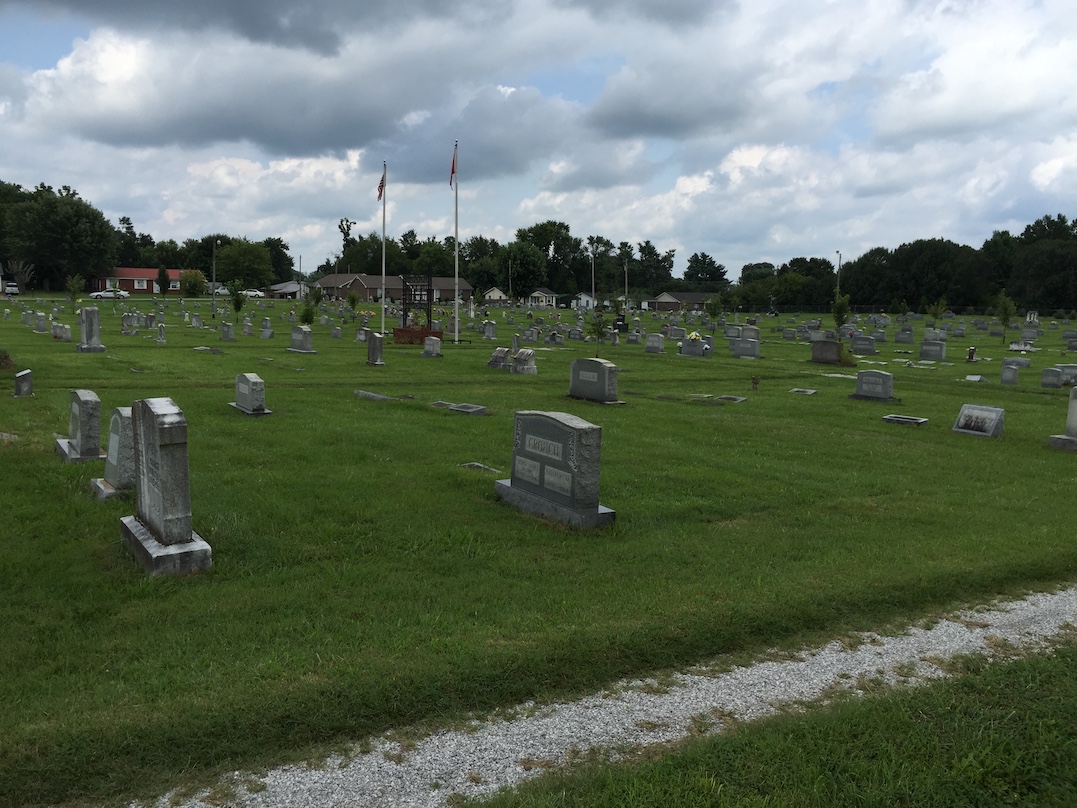
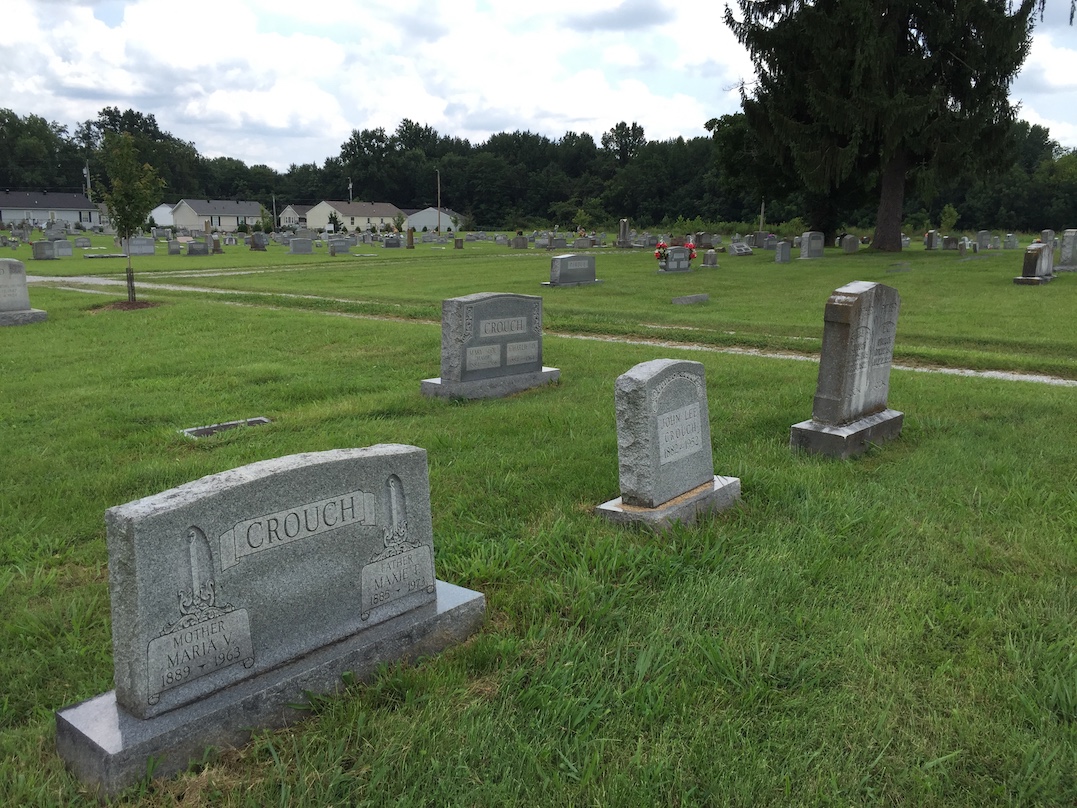

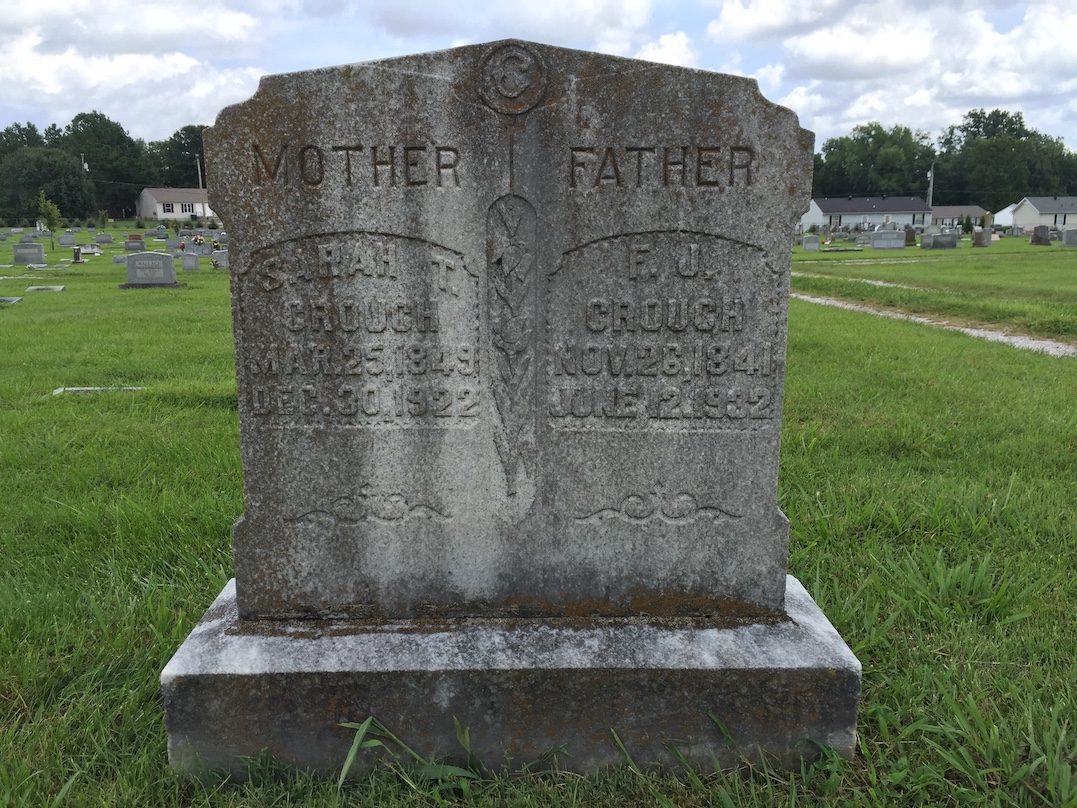
MOTHER
Sarah T. Crouch
March 25, 1849 - December 30, 1922
FATHER
Franklin Jackson "F. J." Crouch
November 28, 1841 - June 12, 1932
(Parents of C. D. Crouch)
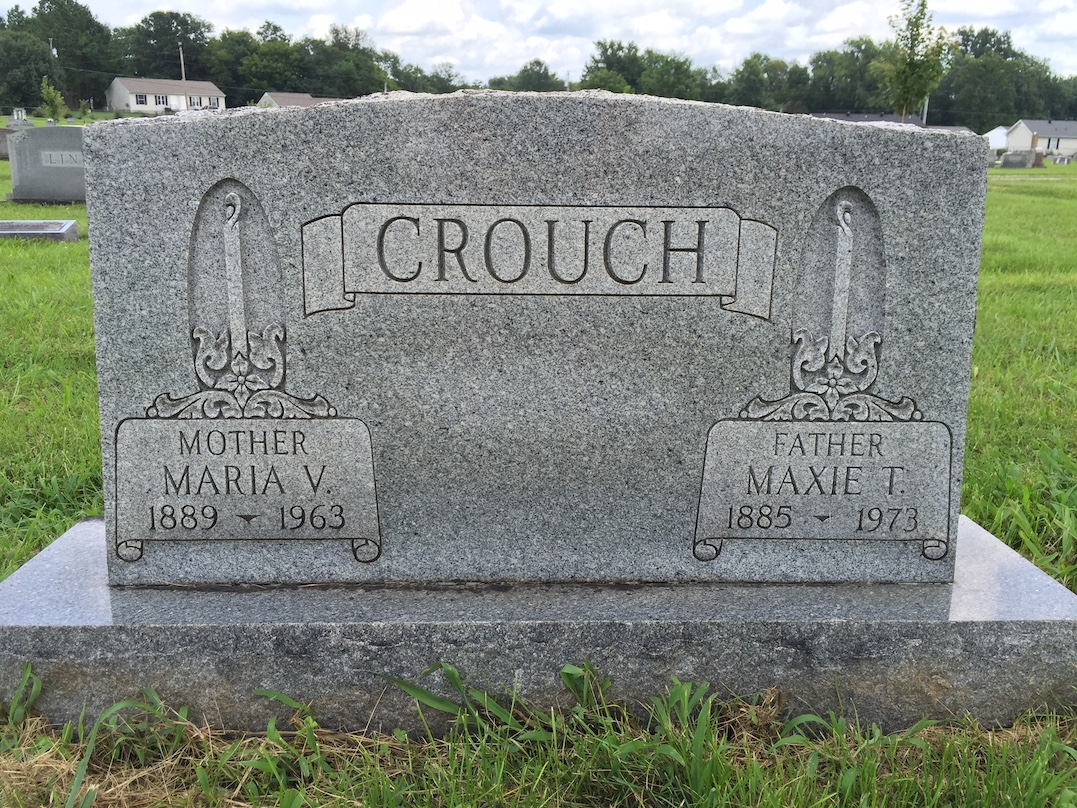
CROUCH
Mother - Maria V. - 1889 - 1963
Father - Maxie T. 1885 - 1973
(brother of C. D. Crouch
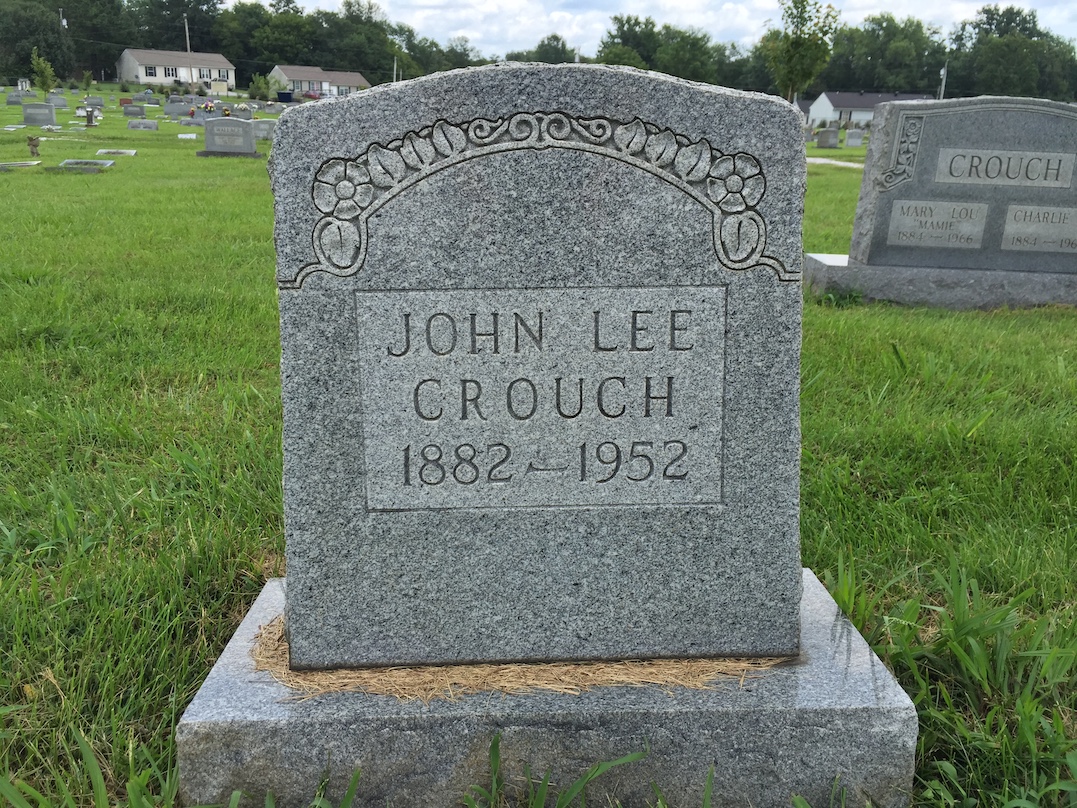
John Lee Crouch
1882 - 1952
(Brother to C. D. Crouch)
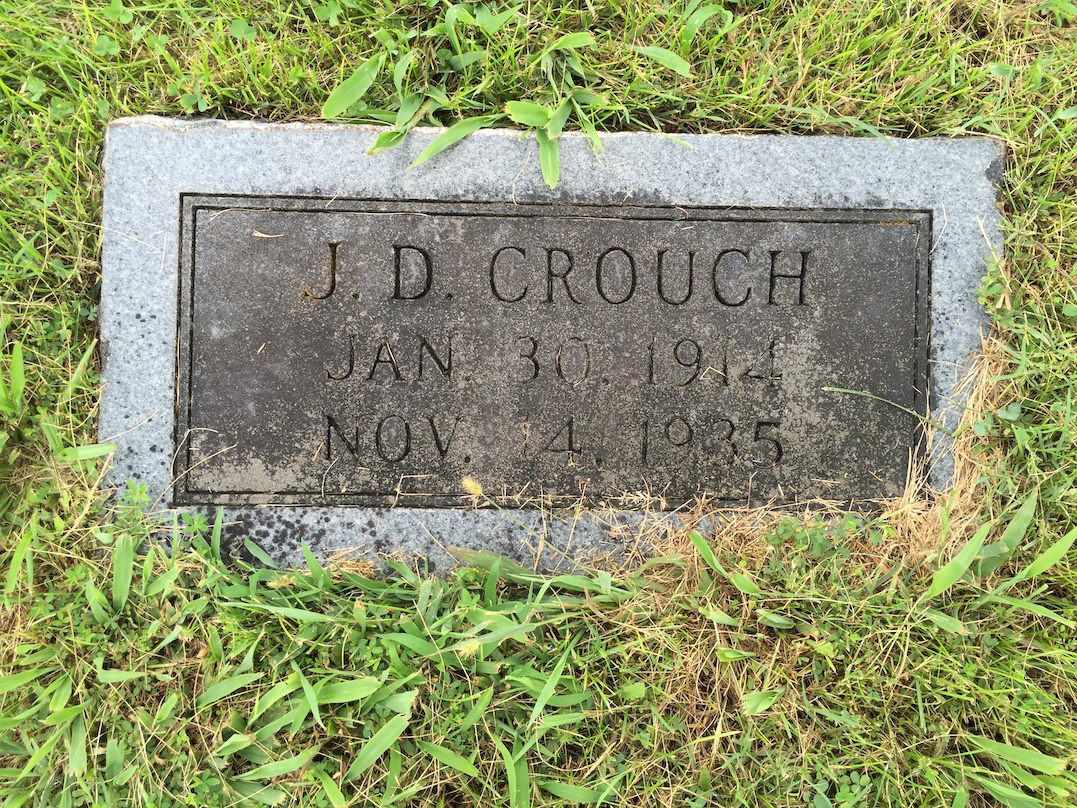
Jackson Daniel Crouch
January 30, 1914
November 4, 1935
(son of Charlie & Mamie Crouch)
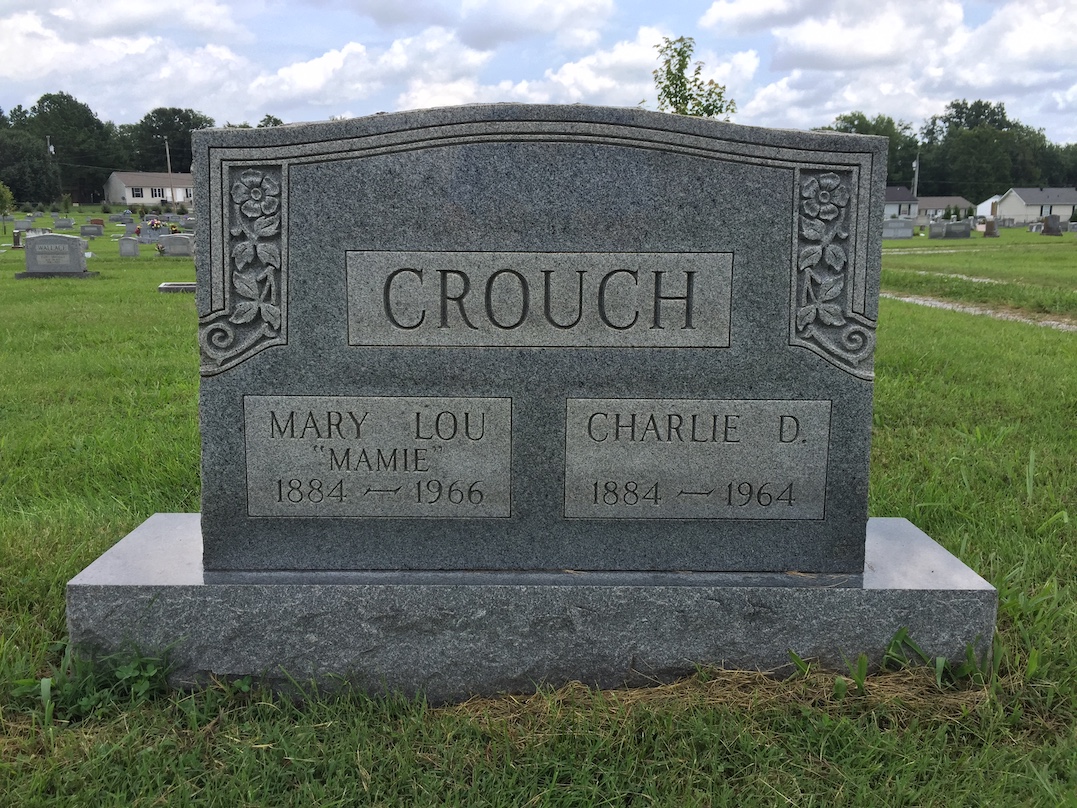
CROUCH
Mary Lou "Mamie" - 1884 - 1966
Charlie D. - 1884 - 1964
![]()
Photos Taken - 08.06.2016
Webpage produced - 02.10.2021
Courtesy Of Scott Harp
www.TheRestorationMovement.com
![]()

